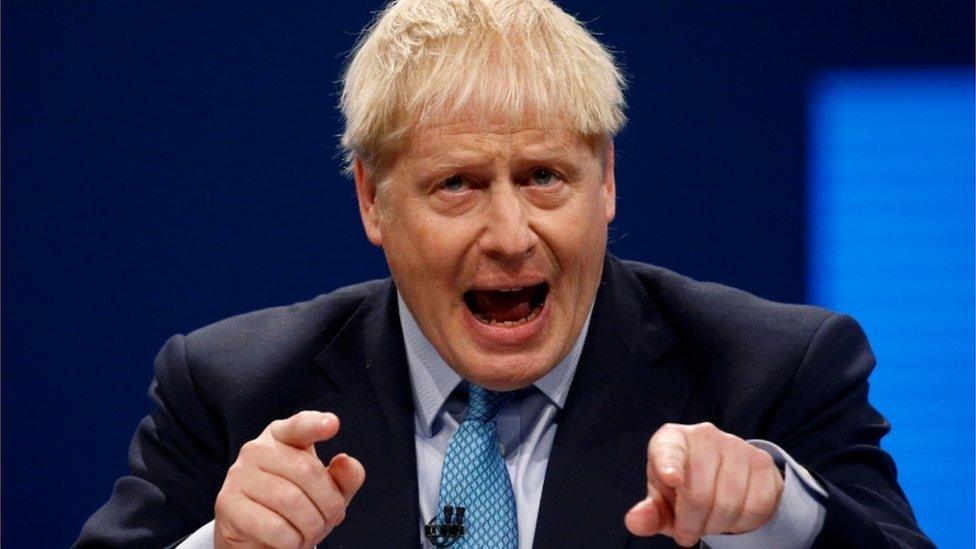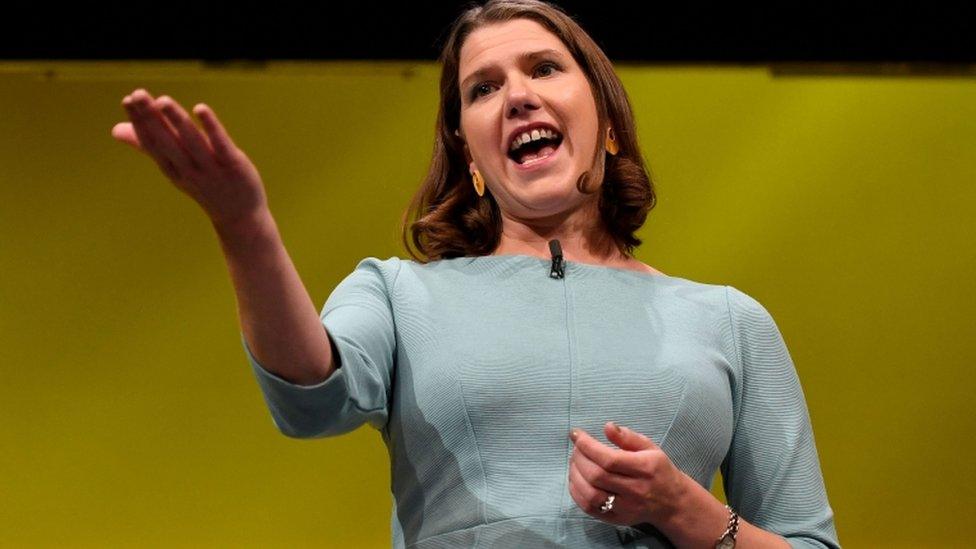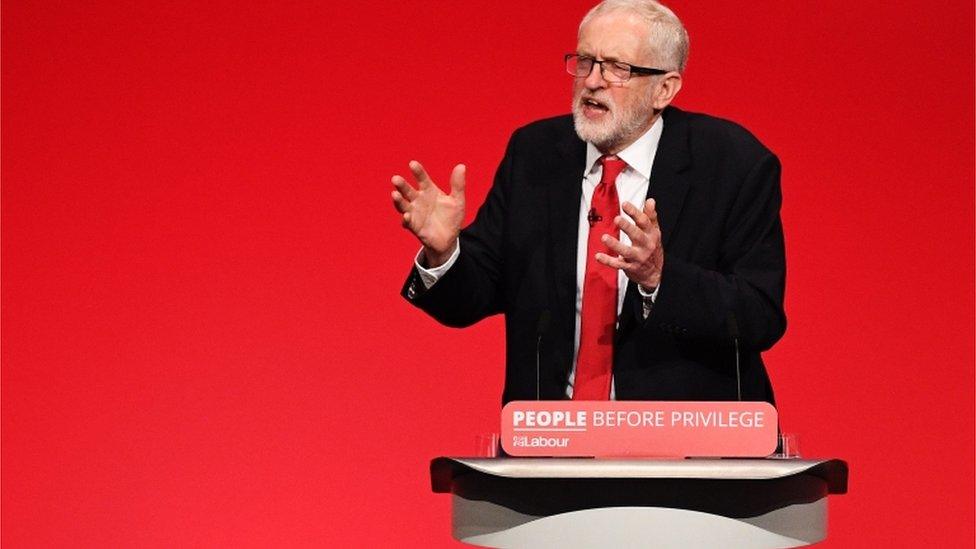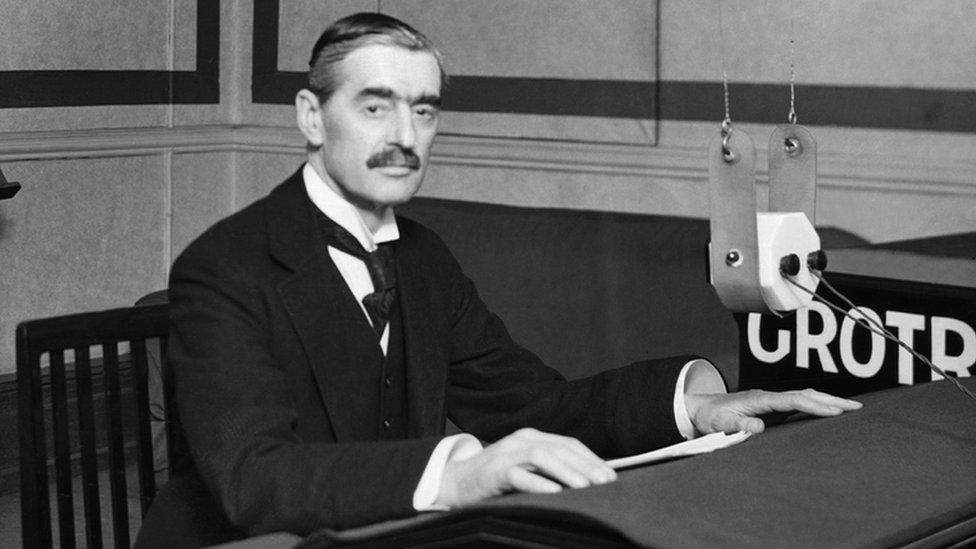Government can't govern: Opposition can't oppose
- Published

Boris Johnson gives his keynote speech to the Conservative conference in Manchester: He wants to get Brexit done
Can't move. Won't move.
Be it a white rabbit or a pig in a poke, Boris Johnson's "final offer" to the EU negotiators in his keynote speech to the Conservative conference enabled his supporters to portray it as an attempt to end the Brexit stalemate.
Reflecting on my interviews with each of our main Parliamentary party leaders over the past three weeks, it's no wonder our politics is in such a jam.
Jo Swinson told me how the Liberal Democrats would unseat Conservative MPs in Remain-supporting places like Cheltenham where her party finished a strong second last time. Her message was that the "seismic change" in politics would enable a Liberal Democrat government to prevent or reverse Brexit without recourse to a further referendum.
"Neither Liberal nor Democratic" was how Bromsgrove's Conservative MP, the Chancellor Sajid Javid, described that in his party conference speech. I have never known a Tory conference where the Lib Dems have been attacked so often. Brexit is redefining the battle lines in ways which show how far we have come since the Cameron-Clegg coalition.

Jo Swinson at the Liberal Democrats conference. She wants to prevent or reverse Brexit
Jeremy Corbyn explained to me how he wanted a general election so that a Labour government could negotiate a new Brexit deal which would then be put to the country in another referendum offering "credible options" for Leave or Remain: in other words, he would offer electors the chance to vote against the very agreement negotiated by his own government, while he himself would remain "neutral".
How easy would it be to sell neutrality into an electoral marketplace which seems to be polarising with every passing day? We used to talk about the middle ground, Middle England, being where elections were won and lost. This looks more like a land of extremes.
In the last of my interviews, Boris Johnson was absolutely uncompromising. At the other end of the scale from Jo Swinson, the Prime Minister told me "we need to get Brexit done", with or without a deal, "to deliver the mandate of the people."
That's the message he will be taking to Leave-supporting areas, currently held by Labour, in the Black Country and Stoke-on-Trent. One of the themes of Sajid Javid's warm-up act in Manchester was that the Conservatives were now the real party of working people, and therefore, of labour.
Can't vote
So when can we expect these slogans finally to be tested in those key marginals of ours?

Jeremy Corbyn at the Labour Party conference: He wants to be able to negotiate a new Brexit deal
It's clear the opposition parties are split over who should lead a temporary government of national unity formed specifically to avoid no-deal. Jeremy Corbyn may indeed lead the principal Opposition party, but for ex-Labour MPs who have defected to the Liberal Democrats largely to escape him it would be too much to expect them to serve under him again. While ex-Conservative defectors are scarcely better-disposed to a Corbyn government than they were before.
This amounts to one big reason that we do not expect a vote of no confidence either this week or next.
But surely something has to give eventually. One thing the Opposition parties can agree on is that they want to trap Mr Johnson in office until after the next European Council meeting in two weeks' time: unable, they still believe, either to secure a deal or to avoid an extension, leaving him in no position to fight a convincing election campaign.
Can't wait
This is the theory that's been doing the rounds during conference season, which identifies the end of that EU Summit in two weeks' time as the moment when the Opposition will finally strike and table their long-awaited no-confidence motion.
Should a general election be triggered, the likeliest date would then be Thursday 28th November.
And the last time Britain went to the polls in the eleventh month?
Can't remember
Thursday 14th November 1935!

Birmingham Edgbaston MP Neville Chamberlain took over as Prime Minister from Stanley Baldwin. Chamberlain resigned in 1940 and Winston Churchill took over.
That, incidentally, was the only time one Midlander was replaced by another in Number Ten. The Conservative MP for Birmingham Edgbaston, Neville Chamberlain MP took over from his party colleague Stanley Baldwin, the MP for Bewdley.
It was a moment in this country's stormy past that's still talked about 84 years later.
Much in the same way as I reckon our Brexit convulsions will still be keeping historians arguing for just as many years to come.
